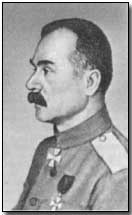Who's Who - Alexei Kaledin
 Alexei Maximovitch Kaledin
(1861-1918) served as an active field commander in the Russian army during
World War One before organising resistance to the Bolsheviks in the wake of
the October Revolution of 1917.
Alexei Maximovitch Kaledin
(1861-1918) served as an active field commander in the Russian army during
World War One before organising resistance to the Bolsheviks in the wake of
the October Revolution of 1917.
Born on 24 October 1861 the son of a Don Cossack officer, Kaledin chose a military career at an early age and became closely associated with General Alexei Brusilov during World War One. He served with Brusilov first in Galicia in 1915 at the head of a cavalry division, and again as commander of the Russian Eighth Army when launching the spectacularly successful Brusilov Offensive at the Battle of Lutsk in early June 1916.
His forces succeeded in catching the Austro-Hungarian Fourth Army led by Archduke Josef Ferdinand entirely by surprise, with the loss of 130,000 Austro-Hungarian troops within the first two days of the offensive.
Coming out in opposition to the military reforms instigated by the Provisional Government following the February Revolution of 1917, Kaledin was dismissed in May 1917.
Subsequently returning to the Don region he became a leader (Hetman) in June 1917 after expressing sympathy for the Cossack movement in favour of local autonomy.
With the ascent of the Bolsheviks following the October Revolution the Don territory asserted its virtual independence from the Soviet government, and was viewed as a haven for both political and military figures effectively exiled by the Bolsheviks.
Kaledin opted a policy of welcoming the exiles and permitted them to organise themselves into an anti-Bolshevik Army. It was therefore inevitable that the Bolshevik government should despatch a force to re-establish control in the Don region and to destroy Kaledin's independent army.
In the wake of a succession of military setbacks and with diminishing Cossack support, Kaledin was obliged to flee Taganrog towards the close of January 1918. Finally, with the prospect of the loss of the Don part of Rostov, Kaledin resigned and committed suicide, shooting himself on 11 February 1918.
Battle Police were military policemen deployed behind an attack to intercept stragglers.
- Did you know?
